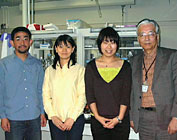Dr. Kunihiko Obata's researching career had spanned more than 40 years when he arrived at BSI last year. He joined the Institute after working at the National Institute for Physiological Sciences, under the Okazaki National Research Institutes (now the National Institutes of Natural Sciences).
Late Nights with a Graduate Student
"I come from a medical family, so when I reached university age, I chose medical school almost blindly. Looking back, medical practice in those days seem quite primitive. Antibiotics were the only available form of treatment, and diagnosis could only be confirmed with an autopsy. While the front lines of medicine are now armed with newly developed diagnostic methods and medical treatments based on the latest research findings and technology, I was hesitant about pursuing a path as a clinician with the state of clinical practice when I was a student."
An influential encounter as a student helped point Dr. Obata in the direction of research.
"Senior students, sometimes only one-year older, commonly taught younger ones when I was a student. One graduate student, who oversaw a two-month physiology laboratory course, showed genuine enthusiasm for research as he guided us through experiments, data analysis, and presentation techniques. And when everyone else took off to prepare for other subjects, I remained in his lab. The two of us worked late every night eating fried rice that he ordered in."
Smiling Dr. Obata says that it was during this time that he discovered his passion for research.
"The joy of research is seeing your how research themes relate to your own questions about, not just in those things you were assigned, and working toward a solution. While I can't say it is exceptionally exciting, young researchers are able to convey this passion to students. I'd like young people to realize the importance of teaching their juniors."
What is a "Bad" Student?
"Sometimes I feel sorry for today's young people. When I was young, there were still so many unsolved and unexplored areas. As a result, we were relatively free to choose our own research topics.
"But, as the numbers of researchers and the variety of research being done increased, the pace of research, driven by technical advances, also increased. In the past, an experiment using a cat's brain would take a year. We had to use handcrafted electrodes to capture tiny cell tissues that were invisible to the eye. Now, the same experiment can be finished in a week by removing living rat or mouse brains and observing cells with microscopes. Of course, this has meant competition has become more intense and one may no longer have the luxury to pursue research one's area of interest."
Nonetheless, Dr. Obata feels that it is still extremely important for researchers to be continually aware of what they want to know.
"At Harvard, I studied under Professor Kuffler. He was a very friendly and considerate person. Still, he would often say, 'only half of my lab members really work', or 'it's better to have no students than bad students.' A bad student, for Prof. Kuffler, was not one lacking knowledge or academic prowess but one lacking the motivation and initiative to pursue research.
"Kuffler's laboratory attracted a large number of American graduate students and researchers. Yet no one would hold your hand in this non-interventionist environment. To achieve anything at all, you needed exceptional discipline and a clear understanding of your ideas. I believe that this environment helped develop those leaders who were active all over the world Iater."
Researchers Need "Mobility" Too
In selecting affiliations in which to conduct research, Mr. Obata urges researchers to be more open-minded.
"Many people choose not to work at regional universities or research centers even when they receive offers from these places. Maybe they want to live in the big cities like Tokyo or Osaka; but, if it is possible to do the research they want to do in these local centers, this is not a sufficient reason not to go. The differences between large and small cities have largely disappeared. And as competition between universities heats up ー partly due to university incorporation ー regional universities are looking for excellent researchers as well. Researchers should seize these opportunities.
"Working in various environments is sure to motivating researchers. In my student days, I visited laboratories all over the place to use equipment or have samples refined. Along the way, I met and talked with many people. From these discussions, I realized just how narrow my perceptions were. Unexpected breakthroughs to my dead-ends were often inspired from these conversations. Therefore I encourage all young researchers to break out of their shells and test their abilities around the world.
"I have returned to the same research topics of my graduate days; however, I published several papers in fashionable research areas with the latest technology of the time during my career. Unfortunately, working alone, my progress was limited and the papers were soon forgotten. With this in mind, I would like to close with the following thought: While it is relatively easy to earn significant contentment and acclaim by obtaining results with the latest research equipment in research fields that are considered the cutting-edge or that are in vogue, research papers that provide clear answers (i.e. those that ask few questions) are more readily adopted. Systems that assist researchers in developing expansive, long-term research into innovative topics are needed. Such research should be supported even if partial answers already exist or the proposal of the problem alone seems possible.






